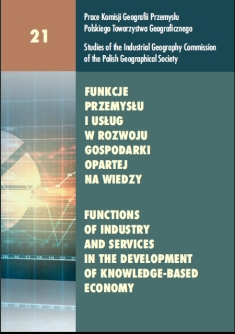The Priorities of Industrial Policy in European Union Towards Challenges of the Global Crisis
DOI:
https://doi.org/10.24917/20801653.21.3Keywords:
industrial policy, innovation, economic crisis, market failuresAbstract
The current global economic crisis has challenged the neoliberal belief that in recent decadesformed the basis of views whose assumption was to minimize public interference in the economy.Thus, industrial policy has again become a subject of discussion. Despite the fact that we livein a postindustrial era in which biotechnology, information and services are identified as the sourceof economic growth, no one can ignore the manufacturing industry. It is crucial for the formation ofstructural changes in the economy and it generates new jobs. The most desirable is the active industrialpolicy which is to stimulate the growth of innovation and increase the efficiency and internationalcompetitiveness of enterprises. This approach is the essential instrument, by which the government in fluences the structural changes in the industry, giving them the desired direction and pace to help overcomethe crisis. The European experience emphasized the need to create the right framework conditionsfor a more dynamic development of the industry. The key competitive factors are human resources andmodern technologies, and consequently, efforts should be directed to the promotion of human capitalevolution and higher investment in research and development.The analysis is to identify the role, importance and trends of industrial policy in dealing with thecontemporary economic problems in the European Union. The paper presents the evolution and theessence of the today’s approach to industrial policy. Then it is discussed the trends of industrial policyin selected European countries and described the assumptions of the integrated approach to industrialpolicy in the European UnionDownloads
Metrics
References
Aiginger, K., Sieber, S. (2005). Towards a Renewal Industrial Policy in Europe. Project Lead Hannes Leo. WIFO. Pozyskano z: http://karl.aiginger.wifo.ac.at/.
Bianchi, P., Labory, S. (2006). International Handbook on Industrial Policy. Massachusetts: Edward Elgar Publishing Limited.
Bianchi, P., Labory, S. (2011). Industrial Policy after the Crisis. Seizing the Future. Cheltenham: Edward Elgar Publishing.
Breznitz, D. (2007). Innovation and the State. New Haven and London: Yale University Press.
European Commission (2004). Communication from the Commission of 20 April 2004: Fostering Structural Change: an Industrial Policy for an Enlarged Europe. COM(2004) 274 final.
European Commission (2012). Communication from the Commission to the Parliament, the Council, the European Economic and Social Committee and the Committee of the regions: A Stronger European industry for Growth and Economic Recovery. Industrial Policy Communication Update. COM(2012) 582 final.
European Commission (2010). Communication from the Commission: Europe 2020. A Strategy for Smart, Sustainable and Inclusive Growth. COM(2010) 2020 final.
European Commission (2002). Communication of 11 December 2002 on: Industrial Policy in an enlar¬ged Europe. COM(2002) 714 final.
European Commission (2012). The EU in the Word. A Statistical Portrait. Luxembourg: Publications Office of the European Union.
Eurostat (2012, 29 listopada). Employment Growth and Activity Branches. Pozyskano z: http://appsso. eurostat.ec.europa.eu.
Eurostat (2012, 29 listopada). Industry Production Index. Pozyskano z: http://appsso.eurostat.ec.euro¬pa.eu.
Eurostat (2012, 29 listopada). Real GDP growth rate value. Pozyskano z: http://appsso.eurostat.ec.eu¬ropa.eu.
Eurostat (2012, 29 listopada). Total high-tech trade in million euro and as a percentage of total (from 2007, SITC Rev. 4). Pozyskano z: http://appsso.eurostat.ec.europa.eu.
Eurostat (2012, 29 listopada). Total intramural R&D expenditure (GERD) by sectors of performance. Pozyskano z: http://appsso.eurostat.ec.europa.eu.
Federal Ministry of Economics and Technology (2012, 20 grudnia). European Industrial Policy. Pozyskano z: www.bmwi.de.
Klamut, M. (2006). Polityka przemysłowa. W: B. Winiarski (red.), Polityka gospodarcza. Warszawa: PWN, 245–257.
Komisja Europejska (2010). Zintegrowana polityka przemysłowa w erze globalizacji. Konkurencyjność i zrównoważony rozwój na pierwszym planie. KOM(2010) 614.
Komisja Wspólnot Europejskich (2005). Komunikat Komisji: Wdrażanie wspólnotowego programu lizbońskiego: Ramy polityczne dla wzmocnienia przemysłu UE – w kierunku bardziej zintegrowa¬nego podejścia do polityki przemysłowej. COM(2005) 474 końcowy.
Ministerstwo Gospodarki (2007). Koncepcja horyzontalnej polityki przemysłowej w Polsce. Pozyskano z: www.mg.gov.pl.
Owen, G. (2012, 2 grudnia). Industrial Policy In Europe Since the Second World War: What Has Benn Learnt. ECIPE OCCASIONAL PAPER, 1/2012. Pozyskano z: www.ecipe.org.
Rifkin, J. (2012). Trzecia rewolucja przemysłowa. Jak lateralny model władzy inspiruje całe pokolenie i zmienia oblicze świata. Katowice: Wydawnictwo Sonia Draga.
Stachowiak, K. (2009). Ewolucja przemysłu zaawansowanej technologii i sektora teleinformatycznego (ICT) w Finlandii. Prace Komisji Geografii Przemysłu Polskiego Towarzystwa Geograficznego, 13, 122–132.
Tajani, A. (2012, 3 grudnia). A Stronger European Industry for Growth and Economic Recovery, Press Conference 10 October 2012. Pozyskano z: http://ec.europa.eu/enterprise/index_en.htm.
Talar, S. (2007). Determinanty konkurencyjności gospodarki Irlandii. W: T. Bernat (red.) Przedsiębiorstwo i państwo – wybrane problemy konkurencyjności. Szczecin: Uniwersytet Szczeciński, 247–258.
The Maastricht Treaty, Maastricht, 7 February 1992. OJ C 191 of 29.7.1992.
The Single European Act, Luxembourg, 17 February 1986. OJ L 169 of 29.6.1987.
Wade, R. (2010). After the Crisis: Industrial Policy and Developmental State in Low-Income Countries. Global Policy, 1–2, 150–161.
Downloads
Published
How to Cite
Issue
Section
License
Articles are published under the terms of the Creative Commons License (CC BY-ND 4.0; Attribution– NoDerivs).

